BORDERING ON TRAGEDY
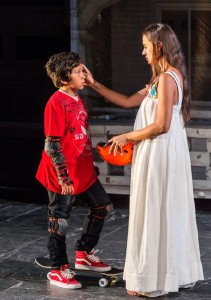 There is a lot to like about playwright Luis Alfaro’s Mojada, a modern retelling of Medea which sets the main character as an undocumented immigrant and seamstress in the East L.A. neighborhood of Boyle Heights. At its best moments, this Euripides redux offers remarkable insight into both the harrowing and promising aspects of the Latino immigrant experience: Medea (Sabina Zuniga Varela) sees the United States as a hide-out while her husband Hason (Justin Huen) sees an opportunity to go from seeking work at a Home Depot parking lot to striking it rich in construction and real estate’”whatever it takes. Their son Acan is the product of Medea’s staunch Mexican traditionalism and Hason’s American Dream. Living with them in a home owned by Armida (Marlene Forte)’”a real estate magnate who has her eyes on Hason’s potential’”is Tita, the abuela/gossip/healer/servant/nurse who also escaped from Mexico (magnificently played by VIVIS, a.k.a. Vivis Colombetti).
There is a lot to like about playwright Luis Alfaro’s Mojada, a modern retelling of Medea which sets the main character as an undocumented immigrant and seamstress in the East L.A. neighborhood of Boyle Heights. At its best moments, this Euripides redux offers remarkable insight into both the harrowing and promising aspects of the Latino immigrant experience: Medea (Sabina Zuniga Varela) sees the United States as a hide-out while her husband Hason (Justin Huen) sees an opportunity to go from seeking work at a Home Depot parking lot to striking it rich in construction and real estate’”whatever it takes. Their son Acan is the product of Medea’s staunch Mexican traditionalism and Hason’s American Dream. Living with them in a home owned by Armida (Marlene Forte)’”a real estate magnate who has her eyes on Hason’s potential’”is Tita, the abuela/gossip/healer/servant/nurse who also escaped from Mexico (magnificently played by VIVIS, a.k.a. Vivis Colombetti).
However, despite a strong cast (especially Zilah Mendoza as the neighbor Josefina, baker and seller of pan dulce), Bruno Louchouarn’s cityscape/music sound design, Raquel Barreto’s costumes, and Alfaro’s trademark cutesy but accessible Spanglish dialogue (“You’re not worth my chilaquiles”), Mojada falls somewhat short of its own aspirations to make the classic tragedy relevant. Medea’s unspeakable crimes at the end seem sudden and unjustified. The arc of the show is left a bit out of whack, and since many earlier moments work so well, Mojada doesn’t follow through with the drama it has set us up for.
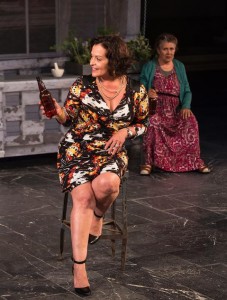 While the character of Medea is treated with immense compassion by Alfaro’”and neither turned into a villain or a diva’”she’s kind of, well, kind of a cool bitch and it’s tough to understand her motivations because we have no idea what has made her so appealing in the past (that part is filled in by the strikingly beautiful and vulnerable Varela). Huen is so accepting, tender, and sweet as the often put-upon head of household Hason that we are left to wonder if he really deserves his fate.
While the character of Medea is treated with immense compassion by Alfaro’”and neither turned into a villain or a diva’”she’s kind of, well, kind of a cool bitch and it’s tough to understand her motivations because we have no idea what has made her so appealing in the past (that part is filled in by the strikingly beautiful and vulnerable Varela). Huen is so accepting, tender, and sweet as the often put-upon head of household Hason that we are left to wonder if he really deserves his fate.
As with his other adaptations, Electricidad and Oedipus El Rey, Alfaro successfully incorporates Latino Teatro with Greek tragedy, examining the many layers regarding community and culture, but he continues to rely on magic realism to tell a story that would work better if we were more invested in the characters themselves than the archetypal plight of the Latino Immigrant. I enjoyed parts of Mojada immensely, and appreciated the conflict when one immigrant betrays another, but it’s as if the storytelling gets lost in the agenda. Some of the scenes are a bit stagnant under Jessica Kubzansky’s direction, but a flashback of a traumatic experience during an illegal border crossing, related by Tita acting as Chorus, is as good as theater gets.
Mojada: A Medea in Los Angeles
The Theatre @ Boston Court
Barbara and Lawrence Fleischman Theater
Getty Villa, 17985 Pacific Coast Highway
Thurs-Sat at 8
ends on October 3, 2015
for tickets, call 310.440.7300
or visit Getty Ticketing
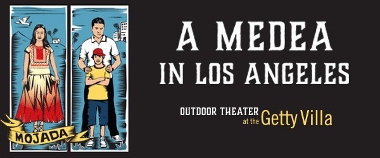
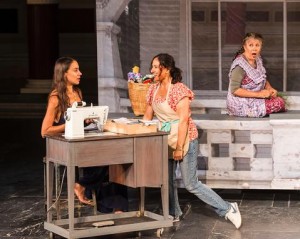
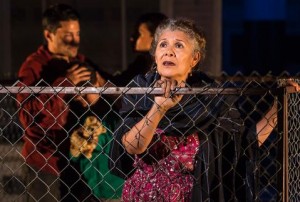
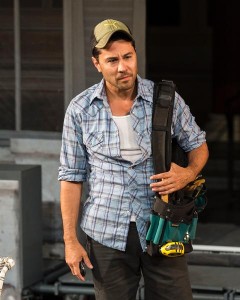

{ 1 comment… read it below or add one }
Good review. I think I liked it more than you did but then I think Luis Alfaro has no best or worst because, in LA theater, he is certainly one of our treasures. But I know Luis which keeps me from being totally objective. I did think the women in the cast were quite wonderful. You know, too, the Getty likes to keep its shows down to 90 minutes. Something may have been lost in the cutting. And when the direction slackened, it was at those moments when it seemed as if the play was taking an unintended leap from one place to another without filling in what seemed to be missing. I don’t know. I had a good time. And it seems you did too.